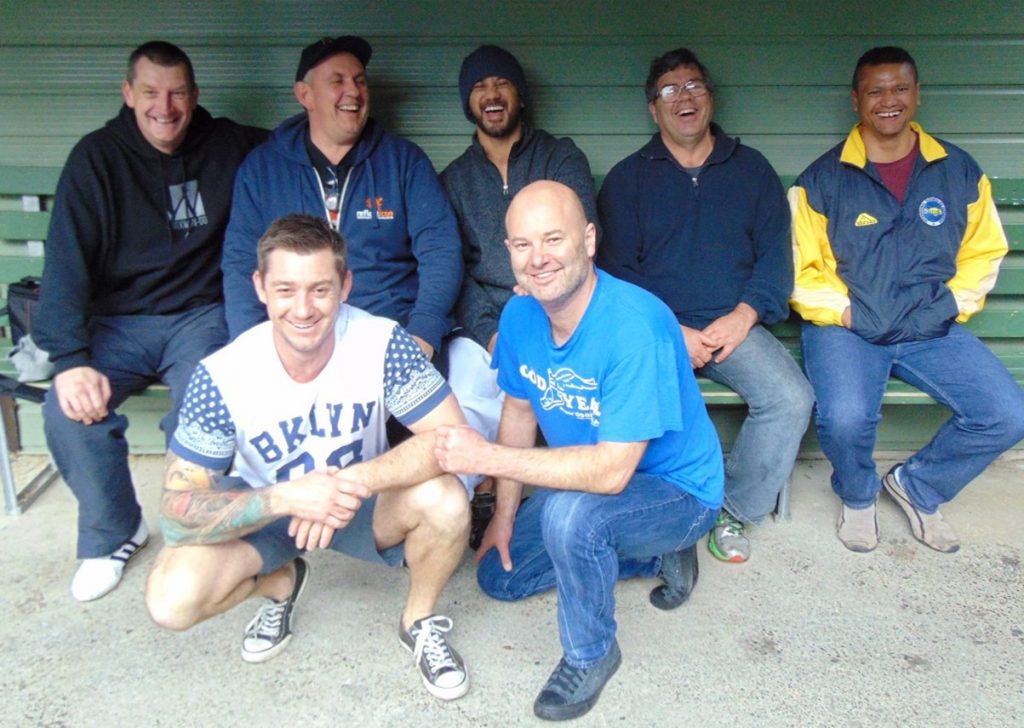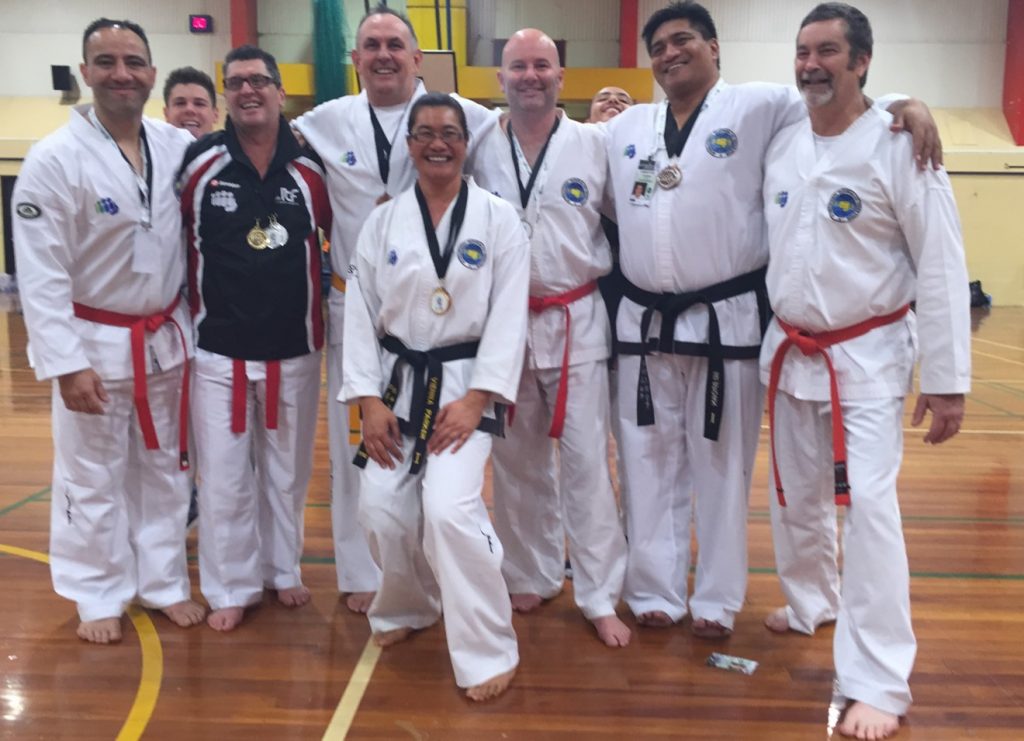Victor Gilpin, 1st Dan Assistant Instructor at Ji Shin Maraetai
It’s never the best way to begin an essay, but I’ll start with a couple of disclaimers.
- Much of what I’m about to discuss will not be new to you. In essence, I’ll be preaching to the converted. Much of the content is well researched, scientifically proven, peer reviewed, and published by reputable organisations. However, some of this content is simply my opinion, based on my experiences.
- The health benefits of TKD, as with many martial arts, are well documented and accepted. There are numerous anecdotal stories and scientific studies published on the subject. A simple google query will open hundreds of citations.
The physical health benefits are reasonably well known, and include:
- Improvements in stamina, muscle tone, flexibility, balance and strength.
- A healthier lifestyle. Your natural eating signals become better regulated, so non-healthy food cravings decrease
- Weight loss. Burnt calories = burnt fat. Also, with an increase in muscle mass, your body will increase its metabolic demand. In New Zealand, weight related Type 2 diabetes is reaching epidemic levels, and is one of the leading contributors to an increase in mortality rates.
- Cardiovascular health. Along with weight loss, and increase in “heart stressing” (getting your pulse up) will improve your cardiovascular system as a whole.
- Increased reflexes. As well as improving your TKD, your reaction time in your day to day activities will also improve, for example your driving. A very important point, considering Motor vehicle accidents are the #1 cause of premature death in New Zealand
Less known to non-TKD practitioners are the positive mental benefits. These include:
- Increased confidence and self esteem
- Understanding and acceptance of good morals and values
- Focus, and the ability to be still.
- Emotional stability and assertiveness
- Decrease in anxiety and depression, and improved mood
- Positive behavioural changes, including a decrease in aggression
These two lists would make the basis of an almost irrefutable argument about the positive benefits of TKD and most martial arts, but I’ll come back to this later.
The World Health Organisation has recently identified depression as the leading cause of ill health and disability worldwide. Mental ill health in New Zealand is both highly stigmatised, and alarmingly common. 1 in 5 NZers are diagnosed with a common mental disorder at some stage in their life, and we have the 2nd highest youth suicide in the OECD, with the number of suicides increasing every year.
This is despite the efforts of public Mental health services, and programs that attempt to destigmatise, and demystify, such as the excellent John Kirwan campaign (http://www.depression.org.nz)
So how does all this fit in with TKD?
My TKD journey began in 2009 when I enrolled my eldest son Asher in a WTF TKD club down the road from us in Basel, Switzerland. We moved back to NZ in 2011, and were keen to enrol him in a club as soon as possible. The closest Dojang was the BOP TKD academy, under the expert tutelage of Master Rimmer.
For the first few months I sat on the side lines and watched my son with pride, quickly making friends with many of the parents and students. I was very impressed with the sense of comradery possessed by this club, which was at a level I had never experienced before with any other club I’d been involved with.
Like so many “more mature” people who start TKD in their later years, I followed my son in to the Art after Master Rimmer said to me one night “you’re always here, why don’t you join in?”. My stomach dropped, and I searched for any reason not to join. Eventually I asked my son if he’d like Dad to join up. Hoping he’d say no, his response was the complete opposite.
Fast forward 5 years, I was privileged to be graded to 1st Dan by Master Rimmer and Master Rounthwaite, alongside my son.
When I reflect on my TKD journey so far, I can clearly see how I have experienced many of the benefits listed earlier. I also see these in my sons (all 3 now train), my TKD friends, and the kids I instruct.
However, the re is another aspect of TKD that we’ve all likely experienced, which is seldom identified or discussed in scientific and anecdotal research – and that is hapori, or community.
re is another aspect of TKD that we’ve all likely experienced, which is seldom identified or discussed in scientific and anecdotal research – and that is hapori, or community.
Most sports have an inherent aspect of community within them. Whether it be due to the common enjoyment of a particular sport, the pack mentality of a team or club, or the simple time spent with each other on a regular basis. In all the sports and organisations I’ve been involved in through my life, none possess the strength of hapori that we experience in TKD.
This hapori exists at club level, regional level, and at a national level. In the short time I have been involved in TKD I have made true friends for life with people from all over New Zealand. These friendships are completely authentic, and are founded on a rock-solid belief system.
So why the difference with TKD, and how does this relate to mental wellbeing?
I believe the difference is the “Do”. The part of our art which differentiates us from other collective groups, sporting or otherwise. The choice we make to live by our tenets, and abide by our oath.
In regards to mental wellbeing, the TKD hapori and the Do are foundational in supporting and bettering my experiences of mental ill health. Like many of you reading this essay, mental ill health is part of who I am, and from time to time can manifest to a point where a feel I can’t cope.
Our TKD hapori is non-judgemental, ever present, always available and full of people who believe in the same positive principles of life.
Following my latest significant episode of mental ill health, I chose to open up to my TKD hapori, sharing my story with anyone who asked. I chose to do this in the spirit of open honesty with people I consider whanau. The result has been liberating, fascinating and overwhelmingly positive.
So, here’s the essence of what I wish to share – and that is simply to share.
Scientific data supports the adage of a problem shared is a problem halved, and while considering sharing your innermost demons can be hugely frightening, in my experience there a few negatives in being open and honest about how you’re really doing with your hapori and whanau. I liken the experiences of sharing my journey through times of mental ill health as similar to how people share stories of their experiences with other illnesses. Whether the topic is heart disease, diabetes, cancer, or a simple broken bone – almost every person you talk to about any of these illnesses will have some understanding of the topic, whether it be due to their own experience of said illness or that of someone close to them.
The first person outside of my immediate family that I discussed my illness with was my Instructor. He had an innate ability to listen when needed, and talk when appropriate. To me this is not just a reflection of his personal experiences and understanding, but also a reflection of the Do and the unspoken, untaught, but required attributes of a senior Dan practitioner.
While the stigma of mental ill health still exists in the greater community, our TKD hapori allows us to speak openly and share confidently in a non-judgemental and supportive way.
For those experiencing mental ill health – please know that your TKD hapori is there for you.
For those privileged to hear peoples’ stories and support their hapori and whanau through the ups and downs – please know that you are something very special to those people who share with you.
Need help? There are organisations that can support you.
www.depression.org.nz
www.mentalhealth.org.nz
www.lifeline.co.nz
www.whatsup.co.nz
www.supportingfamilies.org.nz
www.youthline.co.nz


Thank you Victor, beautifully written and generously shared.
Thank you for sharing Sir, you’re an inspiration to all of us
Kia ora Vic. It’s always a great pleasure to spend time with you and train with you. I recall fondly the coercion we used to get you to join in at club and it was a great thrill to see you and Asher grade to 1st Dan. You’re a great person Vic and the whanau is better for you being in it! Health and strength my friend.